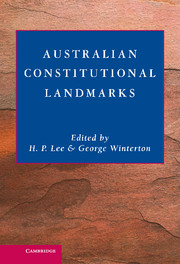Book contents
- Frontmatter
- Contents
- List of Cases
- List of Commonwealth Constitution Provisions
- List of Statutes
- List of Contributors
- Preface
- Introduction: The Commonwealth's Constitutional Century
- 1 The Emergence of the Commonwealth Constitution
- 2 The Engineers Case
- 3 The Uniform Income Tax Cases
- 4 The Bank Nationalisation Cases: The Defeat of Labor's Most Controversial Economic Initiative
- 5 The Communist Party Case
- 6 Fitzpatrick and Browne: Imprisonment by a House of Parliament
- 7 The Boilermakers Case
- 8 The Race Power: A Constitutional Chimera
- 9 The Double Dissolution Cases
- 10 1975: The Dismissal of the Whitlam Government
- 11 The Tasmanian Dam Case
- 12 The Murphy Affair in Retrospect
- 13 The Privy Council and the Constitution
- 14 Cole v Whitfield: ‘Absolutely Free’ Trade?
- 15 The ‘Labour Relations Power’ in the Constitution and Public Sector Employees
- 16 The Implied Freedom of Political Communication
- Index
12 - The Murphy Affair in Retrospect
Published online by Cambridge University Press: 07 October 2011
- Frontmatter
- Contents
- List of Cases
- List of Commonwealth Constitution Provisions
- List of Statutes
- List of Contributors
- Preface
- Introduction: The Commonwealth's Constitutional Century
- 1 The Emergence of the Commonwealth Constitution
- 2 The Engineers Case
- 3 The Uniform Income Tax Cases
- 4 The Bank Nationalisation Cases: The Defeat of Labor's Most Controversial Economic Initiative
- 5 The Communist Party Case
- 6 Fitzpatrick and Browne: Imprisonment by a House of Parliament
- 7 The Boilermakers Case
- 8 The Race Power: A Constitutional Chimera
- 9 The Double Dissolution Cases
- 10 1975: The Dismissal of the Whitlam Government
- 11 The Tasmanian Dam Case
- 12 The Murphy Affair in Retrospect
- 13 The Privy Council and the Constitution
- 14 Cole v Whitfield: ‘Absolutely Free’ Trade?
- 15 The ‘Labour Relations Power’ in the Constitution and Public Sector Employees
- 16 The Implied Freedom of Political Communication
- Index
Summary
The controversy about whether Justice Lionel Murphy should have been removed from the High Court is perhaps the least happy and least edifying of all the great constitutional landmarks considered in this volume. The time that has elapsed since the controversy was brought to an untimely end by his Honour's death in 1986 has not resolved the many issues that were brought to light by the affair. Nor has it provided any assurance of our ability to resolve them if they were to recur again in the future, even with the benefit of hindsight.
Much of this may be due to the sharply conflicting emotions which the central person in the affair evoked. In my experience people tended either to admire Murphy J for his lack of orthodoxy and radicalism as a reforming judge and politician or to deeply distrust and even hate him. My own view of him was mixed and unclear.
From an institutional perspective it is difficult to disagree with the view expressed by some that the protracted proceedings against Murphy J suggests that the present removal mechanism provided in s. 72 of the Commonwealth Constitution is unsatisfactory. A former Victorian Governor and Supreme Court judge, has observed:
When, on the first occasion of modern time in the country, the machinery designed in an earlier era to determine whether a judge ought to be removed, was put into operation in the case of Mr Justice Murphy, it was found quite inadequate to cope with the conditions of today. […]
- Type
- Chapter
- Information
- Australian Constitutional Landmarks , pp. 280 - 311Publisher: Cambridge University PressPrint publication year: 2003
- 1
- Cited by



